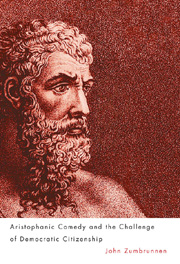Book contents
- Frontmatter
- Contents
- Acknowledgments
- Introduction
- 1 Peaceful Voyages: Peace and Lysistrata
- 2 Ordinary Citizens, High Culture, and the Salvation of the City: Clouds, Women at the Thesmophoria, and Frogs
- 3 Archē and the Anger of the Ordinary Citizen: Wasps and Birds
- 4 Elite Domination and the Clever Citizen: Acharnians and Knights
- 5 Fantasy, Irony, and Economic Justice: Assemblywomen and Wealth
- Conclusion: Democratic Possibilities
- Notes
- Bibliography
- Index
4 - Elite Domination and the Clever Citizen: Acharnians and Knights
Published online by Cambridge University Press: 05 February 2013
- Frontmatter
- Contents
- Acknowledgments
- Introduction
- 1 Peaceful Voyages: Peace and Lysistrata
- 2 Ordinary Citizens, High Culture, and the Salvation of the City: Clouds, Women at the Thesmophoria, and Frogs
- 3 Archē and the Anger of the Ordinary Citizen: Wasps and Birds
- 4 Elite Domination and the Clever Citizen: Acharnians and Knights
- 5 Fantasy, Irony, and Economic Justice: Assemblywomen and Wealth
- Conclusion: Democratic Possibilities
- Notes
- Bibliography
- Index
Summary
Though it ended with a gesture toward the idea of new beginnings, the previous chapter emphasized the seeming inevitability of what appears in Wasps and Birds as an old and familiar problem: the inevitable contingency and illogic of any scheme of rule, of any claim by some to be better fit for positions of power. As I there suggested, this illogic or contingency stands closely related to the challenge of democratic citizenship as I have understood it in this book. Ordinary citizens are called both by democracy's rebellious impulse and by democracy's impulse toward organized collective action. The former impulse suggests that ordinary citizens (in whatever sense they are “ordinary”) ought to resist the rise of any elite. The latter impulse may well allow and perhaps even calls for ordinary citizens to identify and follow “the right leaders,” understood as those who can help the demos pursue its collective ends (including, as Frogs has it, the “salvation” of the city itself). The frequent recurrence of political populism, with its tendency toward the rhetoric of rebellion and its susceptibility to demagoguery—and its apparent anger, even rage—might be seen as evidence of the difficulty of balancing these two impulses or, put differently, of how often ordinary citizens fail to fully meet that challenge of democratic citizenship.
In this chapter, I consider the beginnings of an alternative Aristophanic response to the realities of elite rule in democracy. In doing so, I take as my contemporary point of contact theories of agonal democracy. Like many strands of populist argument, the idea of agonal democracy emphasizes what I have called democracy’s rebellious impulse.
- Type
- Chapter
- Information
- Publisher: Boydell & BrewerPrint publication year: 2012



